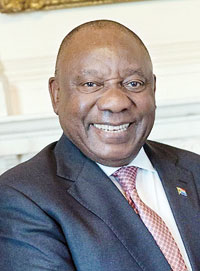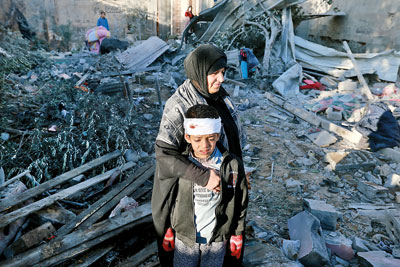Sunday Times 2
Gaza conflict: President Ramaphosa, ‘hamban tota’, do be a ‘malinga’!
View(s):By Shehan Ratnavale
I learned during my time in South Africa that the name of our new seaport town in the Southern Province, and that of our illustrious sling action fast bowler had meanings in the Zulu language.
These names and their meanings came to mind when South African President Cyril Ramaphosa announced that South Africa had referred Israel to the International Criminal Court (ICC), and called for the ICC to issue an arrest warrant for Israeli Prime Minister Benjamin Netanyahu. In the same associative manner, perspectives of the Israeli-Palestinian conflict are steeped with emotional, social and religious linkages. Many of us have our personal journey of associations to this conflict. Therefore before revealing the Zulu meanings, I share my journey.

South African President Cyril Ramaphosa
Perhaps on account of a childhood spent in Germany my first encounter would be the attack by ‘Black September’ Palestinian terrorists at the 1972 Munich Olympics. This hostage crisis culminating in the massacre of eleven Israeli athletes was shocking. On request, my father gave me a detailed explanation. He was essentially a closet Israeli sympathiser, possibly on account of biblical historical associations. But being a former Foreign Secretary of a Government that had closed down the Israeli embassy and invited the Palestine Liberation Organisation to open an office in Colombo, he took pains to accurately convey the position. Despite sadness at the athletes’ deaths, I found it outrageous that Palestinians had been deprived of a homeland and neighboring Arab countries of vast tracts of territory, namely Sinai, Golan, and the West Bank of Jordan. This was the post-1967 Six-Day War position.
Sometime after the Munich events, I accompanied my parents to the Dachau concentration camp which had been converted to a photographic museum. Probably not as well known as Auschwitz and Buchenwald, Dachau was one of the worst concentration camps. Amongst the horrific photos on display were several that showed how medical and surgical experiments were conducted on Jews without their consent. I began to understand my father’s sentiments and moreover why there was a need for a Jewish homeland.
Not being closely associated with life in Israel for Palestinians, my perceptions changed with time. I developed that sense of ‘holocaust sympathy’ felt by many, coupled with a genuine respect for Israeli determination and dynamism. I recollect my teachers praising the enterprise of the Israelis in making the desert bloom with innovations in drip irrigation. I read about their battlefield capabilities in the 1973 Yom Kippur War where they moved from desperate hopelessness to encircling and cutting off the Egyptian third army. Moreover, while sympathising with the Palestinian cause I had only respect for the way Israel handled Palestinian terrorism at Entebbe Uganda, rescuing hostages from under Idi Amin’s nose. Their ingenuity resulted in four international films being released on the topic.
The Palestinians didn’t attract such respect or sympathy. Theirs was initially a conflict of rocks and petrol bombs met with mass arrests and sometimes lethal shootings. Their discontent festered in such forms as the intifada uprisings, encroachment by Israeli settlements, economic marginalisation and the inability to bring about an effective two-state solution.
Speaking at the National Press Club in the US in 2015, award-winning Israeli journalist Gideon Levy made insightful observations about his country that are widely seen as prophetic. He refers to the systematic dehumanisation of the Palestinian people and in explaining how Israelis can live in peace with the brutal reality of their treatment; he says they have surrounded themselves with physical and mental walls. He states: “There was never in history an occupation where the occupier presented himself as the victim, not only the victim, the only victim around. This also enables any Israeli to live in peace because we are the victims.”
But this article does not wish to dilute the viciousness and savagery of the 7th October Hamas attack, and as a Sri Lankan, I am acutely aware that two of our nationals perished in this mayhem. Yet the Israeli response to the barbarity has been unimaginable, killing over 24,600 people with around 70% of that figure being women and children and thousands unaccounted for under the rubble.
While some seek to justify the Israeli horror, Gideon Levy’s recent observations are piercingly insightful. He says: “I keep thinking if one attack as barbaric as it was, and it was barbaric, if one attack pushes so many Israelis to become inhuman. Imagine what it does to Palestinians who lived under these attacks for decades. And we always wonder how come they hate us? How come they became these monsters? How come they are so violent? Here is the answer.”

A Palestinian woman embraces an injured boy as they check the rubble of a building following Israeli bombardment, on Thursday in Rafah in the southern Gaza Strip. AFP
Perhaps the most poignant commentary on the Gaza horror comes from Reverend Doctor Munther Isaac, the Palestinian Pastor of the Lutheran church in Bethlehem. In his Christmas sermon titled ‘Christ under the rubble,’ he states: “This should have been a time of joy. Instead we are mourning, we are fearful…. They say if it takes killing hundred Palestinians to get a single Hamas militant so be it.…. it is self defence we are told. How is the killing of nine thousand children self defence? How is the displacement of 1.9 million Palestinians self defence?”
He also says, “We are tormented by the silence of the world, and leaders of the so called free world lined up to give the green light for this genocide.” He suggests: “Maybe it is because we are on the wrong side of a political equation.”
Certainly with the US vetoing a UN Security Council resolution demanding an immediate ceasefire in Gaza, the equation does appear insoluble. Against this dismal backdrop, President Ramaphosa’s referral of Israel to the ICC saying that Gaza has been turned into a concentration camp where genocide and war crimes are taking place provides rare hope for those wishing to end the humanitarian catastrophe. More recently South Africa has also filed a case at the International Court of Justice (ICJ).
This resolute international leadership by a country that also has a small but thriving Jewish community is commendable. It has a touch of the old Nelson Mandela magic from a President who was Mandela’s original choice to replace him.
The words ‘hamban tota’ in the title means ‘go man’ in the Zulu language and may be used for instance to encourage a footballer rushing to score a goal. The word ‘malinga’ means ‘a man who tries.’ While some believe South Africa’s actions will not deter Israel, others hold that a cease and desist order will be obtained at the ICJ. This might be difficult for Israel to ignore as 153 UN member states will then be obligated to prevent the genocide. Whatever the outcome President Ramaphosa’s initiative should be hailed and applauded, and therefore we should reiterate unequivocally: President Ramaphosa, ‘hamban tota,’ do be a ‘malinga.’
(The writer is a former
High Commissioner to
Singapore and South Africa)

